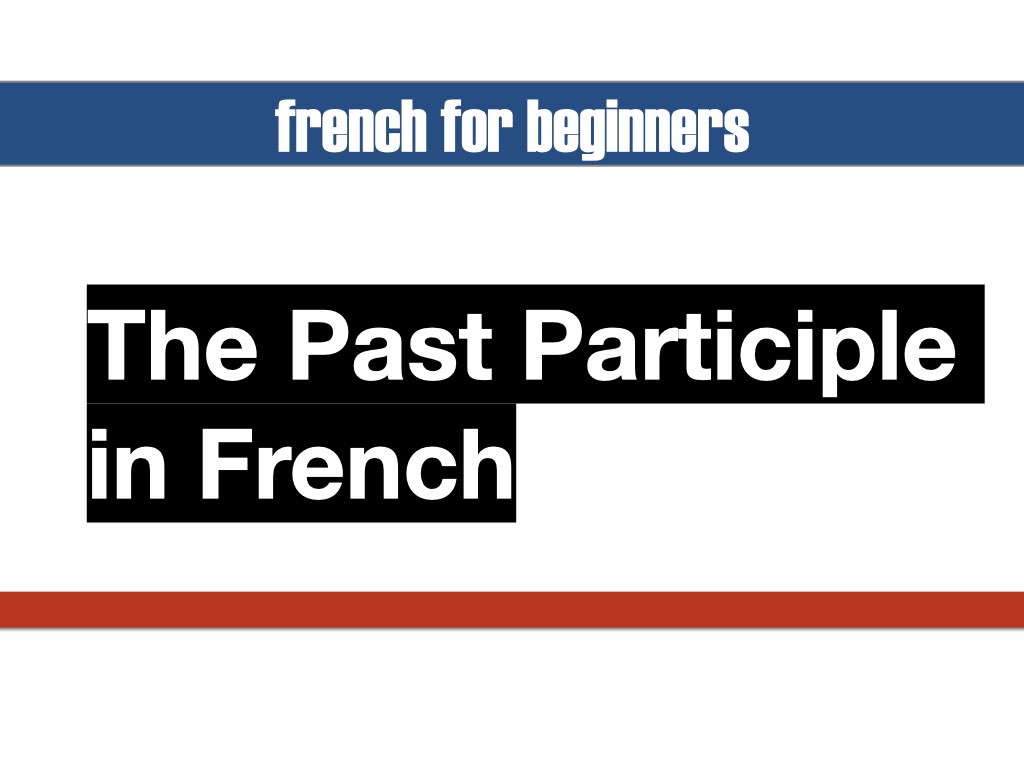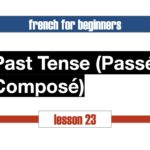The Past Participle in French
Introduction
The past participle is a versatile form used in various tenses in French, including the perfect and pluperfect. It’s essential for forming compound tenses ( like passé composé ) and is also used as an adjective. Understanding how to form and use the past participle correctly is crucial for mastering French grammar.
Examples:
– I saw a friend. (J’ai vu un ami.)
– I offered him a book. (Je lui ai offert un livre.)
– We took the subway. (Nous avons pris le métro.)
These sentences use the past participle in different contexts, illustrating its importance in conveying past actions.
Formation of the Past Participle
The past participle in French can be grouped phonetically into different endings, each with its pronunciation and set of rules.
1. Past Participles Ending in -é [e] (for all verbs ending in -er)
Examples:
“danser” (to dance) becomes “dansé” (danced), “aller” (to go) becomes “allé” (gone), “passer” (to pass) becomes “passé” (passed).
| French Verb | English Meaning | Past Participle (FR) | English Translation |
|---|---|---|---|
| danser | to dance | dansé | danced |
| aller | to go | allé | gone |
| passer | to pass | passé | passed |
2. Past Participles Ending in [i]
This category includes three endings:
➡︎ Ending in -i
For example, “finir” (to finish) becomes “fini” (finished), “choisir” (to choose) becomes “choisi” (chosen), “grossir” (to gain weight) becomes “grossi” (gained weight), “dormir” (to sleep) becomes “dormi” (slept).
| French Verb | English Meaning | Past Participle (FR) | English Translation |
|---|---|---|---|
| finir | to finish | fini | finished |
| choisir | to choose | choisi | chosen |
| grossir | to gain weight | grossi | gained weight |
| dormir | to sleep | dormi | slept |
➡︎ Ending in -is
Such as “prendre” (to take) becomes “pris” (taken), “comprendre” (to understand) becomes “compris” (understood), “apprendre” (to learn) becomes “appris” (learned), “mettre” (to put) becomes “mis” (put).
| French Verb | English Meaning | Past Participle (FR) | English Translation |
|---|---|---|---|
| prendre | to take | pris | taken |
| comprendre | to understand | compris | understood |
| apprendre | to learn | appris | learned |
| mettre | to put | mis | put |
➡︎ Ending in -it
For example, “écrire” (to write) becomes “écrit” (written), “dire” (to say) becomes “dit” (said), “produire” (to produce) becomes “produit” (produced), “construire” (to build) becomes “construit” (built).
| French Verb | English Meaning | Past Participle (FR) | English Translation |
|---|---|---|---|
| écrire | to write | écrit | written |
| dire | to say | dit | said |
| produire | to produce | produit | produced |
| construire | to build | construit | built |
3. Past Participles Ending in -u [y]
Example:
“vivre” (to live) becomes “vécu” (lived), “avoir” (to have) becomes “eu” (had), “lire” (to read) becomes “lu” (read), “devoir” (to have to) becomes “dû” (had to), “pouvoir” (to be able to) becomes “pu” (been able to).
| French Verb | English Meaning | Past Participle (FR) | English Translation |
|---|---|---|---|
| vivre | to live | vécu | lived |
| avoir | to have | eu | had |
| lire | to read | lu | read |
| devoir | to have to | dû | had to |
| pouvoir | to be able to | pu | been able to |
| vouloir | to want | voulu | wanted |
| savoir | to know | su | knew |
4. Special Cases
Examples :
“faire” (to do/make) becomes “fait” (done/made), “être” (to be) becomes “été” (been), “peindre” (to paint) becomes “peint” (painted), “craindre” (to fear) becomes “craint” (feared), “ouvrir” (to open) becomes “ouvert” (opened).
| French Verb | English Meaning | Past Participle (FR) | English Translation |
|---|---|---|---|
| faire | to do/make | fait | done/made |
| être | to be | été | been |
| peindre | to paint | peint | painted |
| craindre | to fear | craint | feared |
| ouvrir | to open | ouvert | opened |
Conclusion
Understanding the formation and use of the past participle in French is key to mastering the language’s grammatical structure. Remembering these rules and practicing with examples will help solidify your knowledge and improve your French writing and speaking skills.


